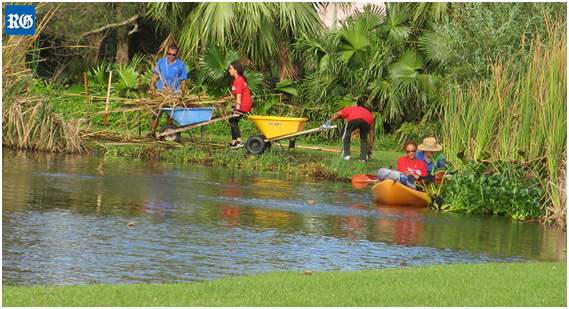Recent News
Flagler College visits Bermuda for Field ExperienceWednesday, July 01, 2015
Though only a small private college located in St. Augustine, Florida, Flagler College has some big dreams for their students in regards to protecting and conserving the environment.
Students facing their fears through Kids on the Reef
Wednesday, July 01, 2015
Awakening a sense of the wonder of the natural world in the lives of students is a vital component of the BZS Education programmes.
Reef Life HD featured on Bermuda Stamps
Wednesday, July 01, 2015
The stunning photography that is the focus of the BZS’s Bermuda Reef Life HD app will now be featured on letters and parcels posted around the world as the Bermuda Philatelic Bureau launched a new set of Bermuda Reef Fish stamps on May 21st.
Breeding Success! Tawny Frogmouth Chicks
Wednesday, July 01, 2015
There has been a lot of excitement in the Zoo over the past few months with the birth of three Tawny Frogmouth chicks.
Trunk Island Project 101 – Clearing the Invasives
Wednesday, July 01, 2015
The BZS purchase of the cottage and 2.4 acres on Trunk Island is a visionary achievement that compliments the educational mission of the BZS in so many ways.
About
GovernanceAbout Us
Newsletter
Latest News
Gift & Bookstore
Contact
General Inquiries
info@bzs.bm
Latest News
All the latest updates and news from the Bermuda Aquarium, Museum, and Zoo, one of Bermuda's leading visitor attractions!
Jonathan Bell
Published Jan 16, 2018 at 8:00 am (Updated Jan 16, 2018 at 6:41 am)

HSBC volunteers help a Bermuda Zoological society team clean up
Cloverdale Pond in Smith's (Photograph supplied)
Two ponds have been cleaned up courtesy of an island conservation programme.
Cloverdale Pond in Smith’s and Southampton’s Evan’s Pond, a refuge for endangered species, were improved through the Bermuda Zoological Society’s wetlands remediation programme.
The scheme, which became the HSBC global water programme for Bermuda in 2014, was designed to remove toxic petroleum compounds from ponds.
The build-up of the poisonous hydrocarbons is a threat to the island’s two endemic killifish species, as well as native diamondback terrapins, which are a protected species.
The compounds, which come from oil, water runoff and vehicle exhausts, can be broken down by bacteria when the pond sediments are aerated.
The two-year grant from HSBC allowed the proposal to be tested in the field.
Volunteers also took part, with help from the Department of Environment and Natural Resources.
The BZS said Cloverdale was chosen first because of its small size, its “known severe effects on wildlife” and the absence of protected species in the water.
Evan’s Pond was selected as the second test site because of its small population of killifish.
The ponds were divided into sections and aerated for six to eight hours a day with solar powered compressors.
Hydrocarbon levels saw a major reduction over the course of a year.
The next site for remediation is the South Pond at the Mid Ocean golf course, where the hatching of diamondback terrapins has been hampered by pollution.


